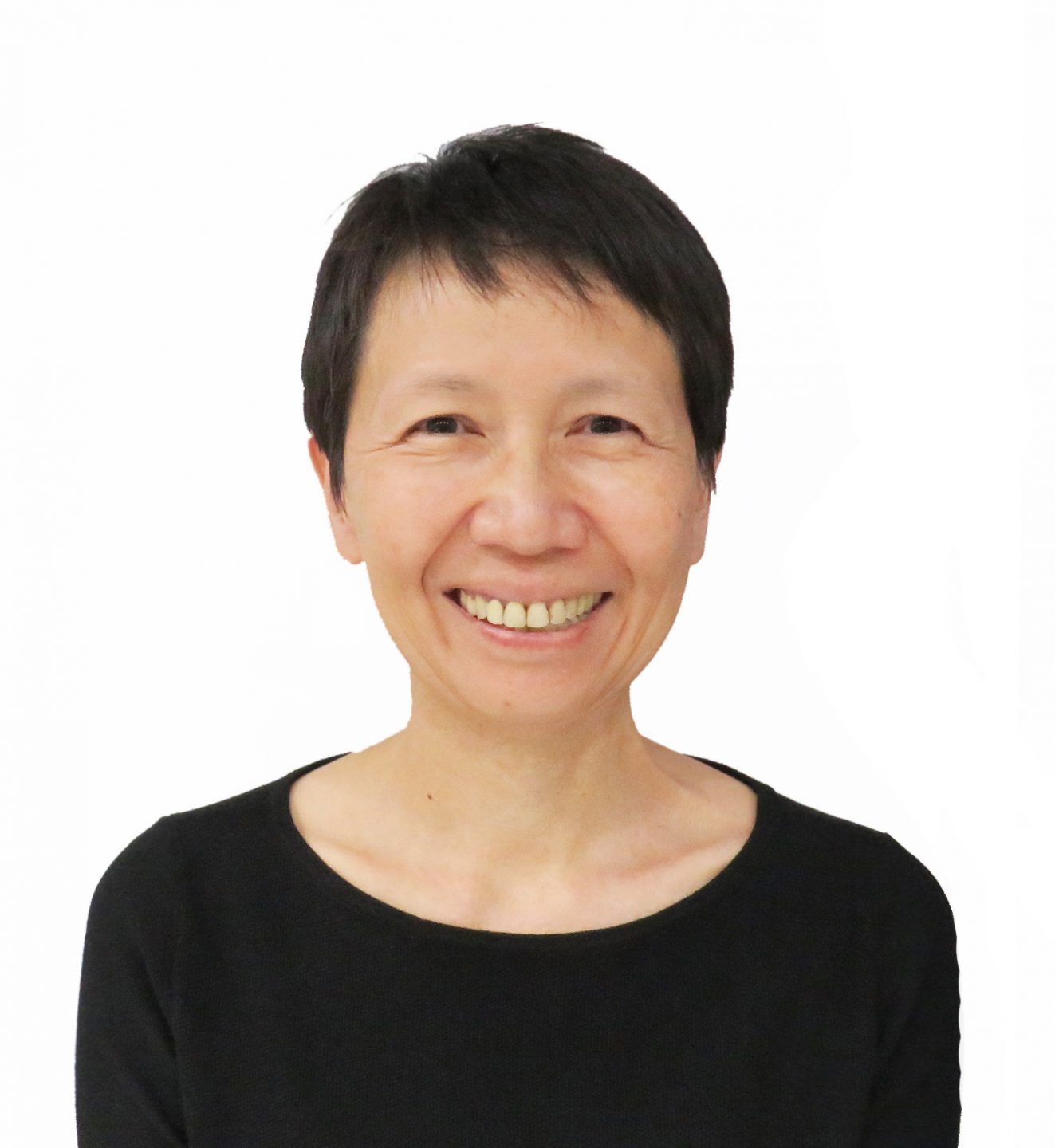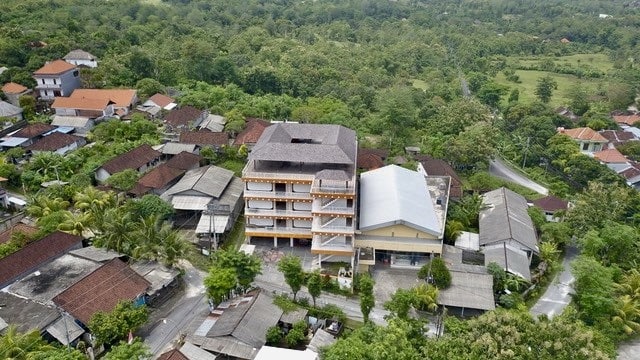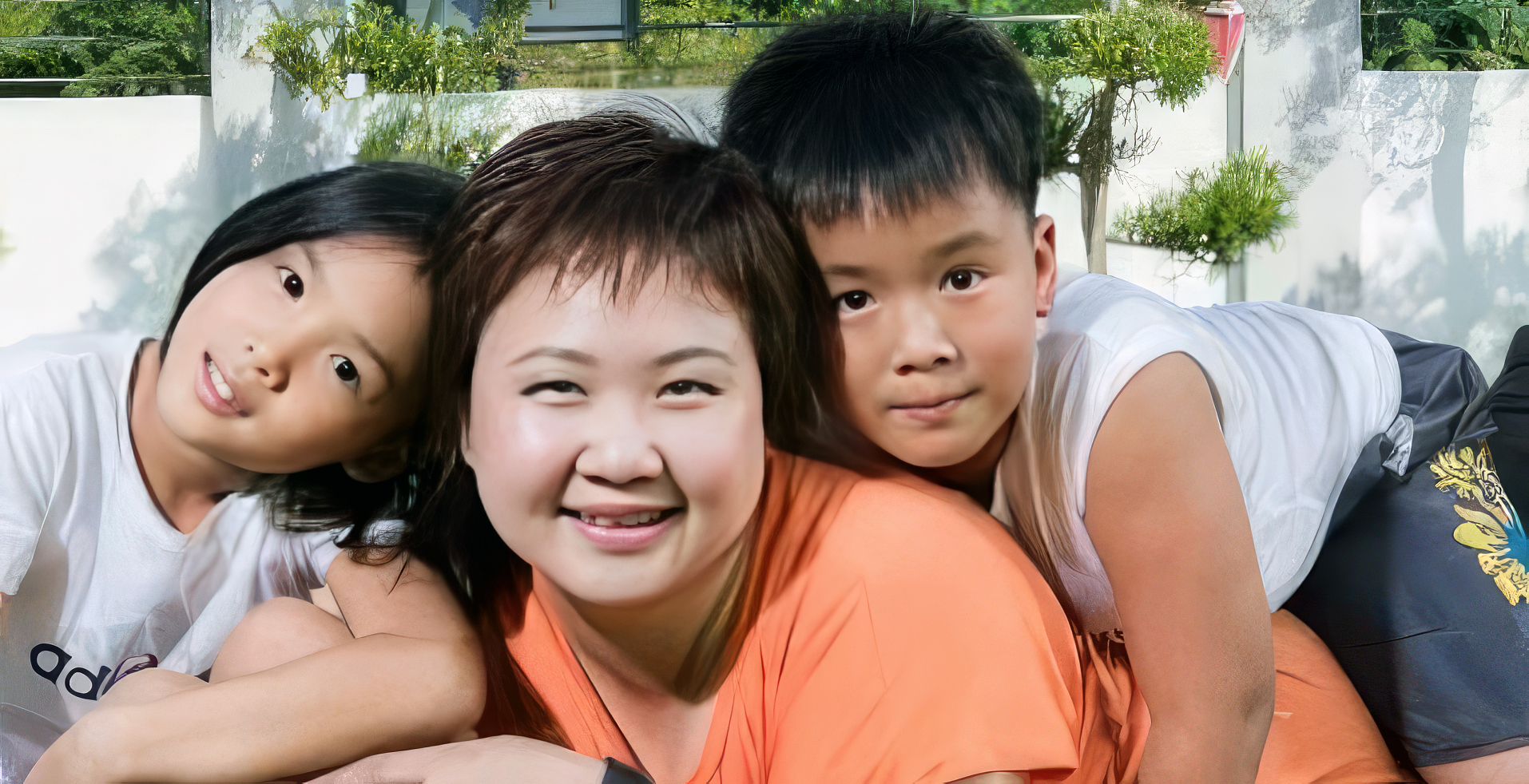They go the extra mile to make sure the elderly are not left behind in the pandemic
Emilyn Tan // October 12, 2021, 5:00 pm
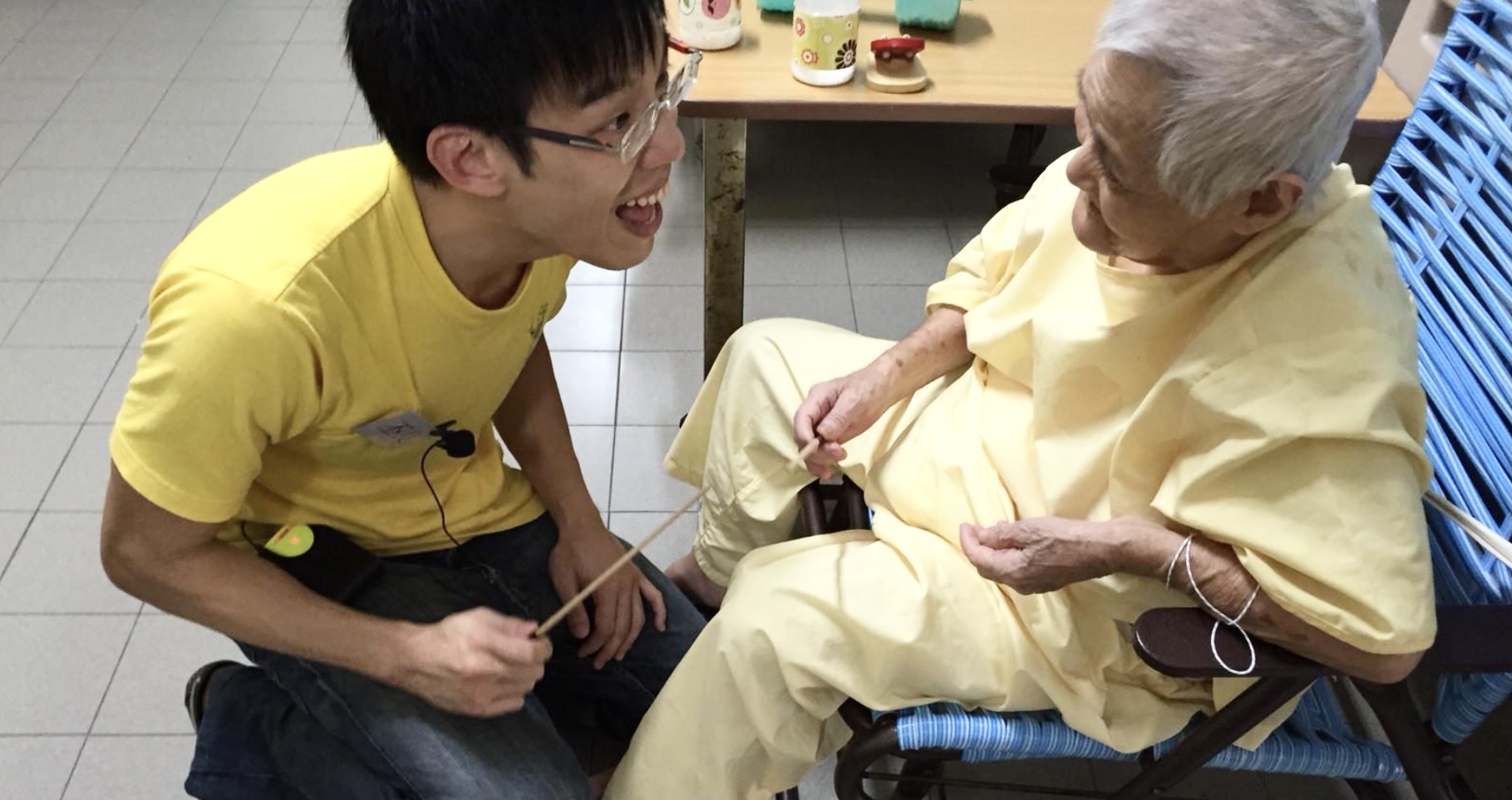
"I see potential in them. I choose to believe that there is still so much more in them": Isaiah Chng gives his all to each elderly person he has the God-given chance to meet. Photo courtesy of Isaiah Chng.
Singapore’s transition into Covid endemicity continues.
In his address to the nation last Saturday (October 9), Prime Minister Lee Hsien Loong estimated our “new normal” to be “three to six months” away. This added an optimistic note to the overall assessment that “there is light at the end of the tunnel, because no transmission wave will last forever”, as Minister of Health Ong Ye Kung said during the press conference that followed.
There is no let-up on the precautions for our elderly.
The simplification of healthcare protocols is much-anticipated, as is the prospect of our borders opening up for quarantine-free travel to 11 Vaccinated Travel Lane (VTL) countries.
There will be additional restrictions for the unvaccinated from today (Oct 13), but for the most part, little about our current lifestyle changes.
That includes the effort to “prevent avoidable deaths” – one of the reasons cited for the stabilisation measures effected at the end of last month.
There is no let-up on the precautions for our elderly, given that Singapore’s 172 covid deaths thus far (as of Oct 11) have been among those aged 50 and older.
The strict measures to protect their health have their down-side. However, three caregivers whom Salt&Light spoke to – each a marketplace minister in a secular setting – cite a simple biblical truth that keeps them pressing on.
Raymond Khoo, The Saturday Movement
Truth: Unconditional love
“I just felt that Jesus loves me unconditionally; it’s the same way we should love all our seniors unconditionally,” restauranteur Raymond Khoo says simply.
Challenges:
Khoo’s The Saturday Movement (TSM) now stretches its banner over six blocks of rental flats in Lengkok Bahru and another two in Redhill.
Responding to the neighbourhood’s ancillary needs, he has also started two social enterprises: the S17 community kitchen and Sungei Road Green Hub.
Pandemic considerations put a halt to TSM’s social activities and the weekly distribution of bread and fruit. Nonetheless, TSM volunteers continue to do weekly check-ins on Lengkok’s residents to see how they are, as well as give them a coupon each for a free meal at S17. (Click here to view an episode on TSM by Channel 8 for its Heart Warmers series.)
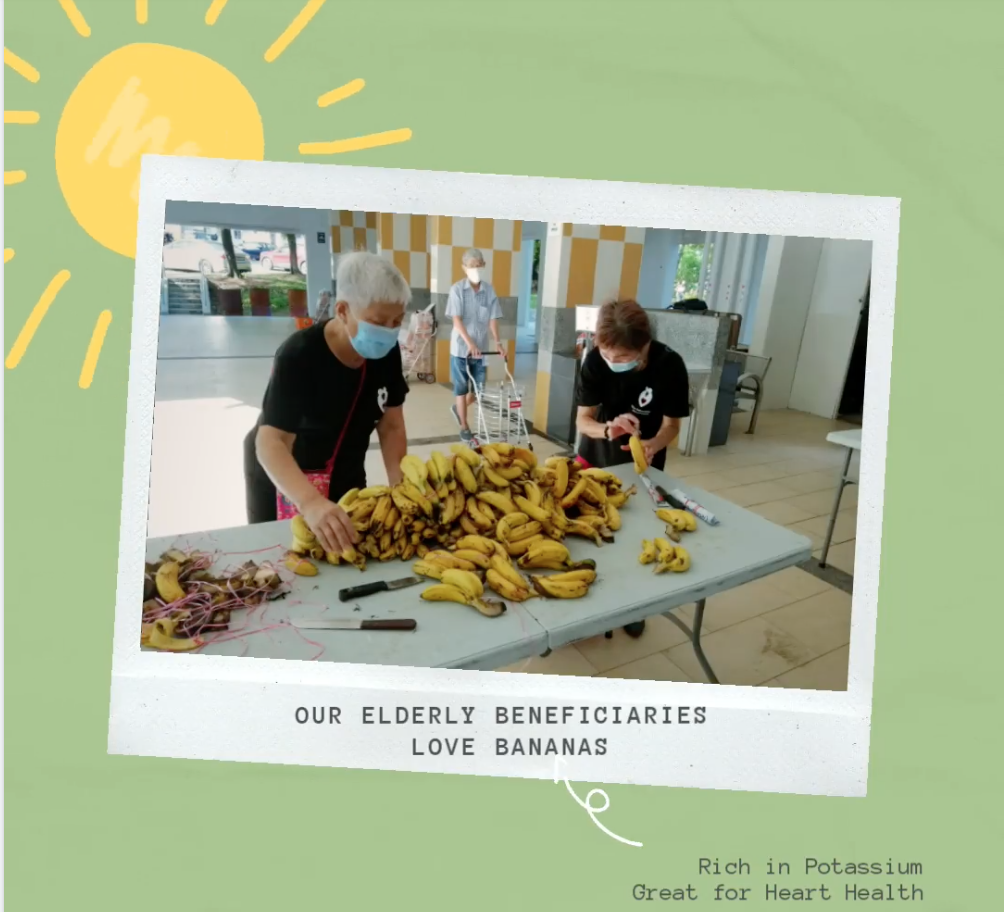
Food for life: Pre-Covid, The Saturday Movement distributed bread and fruit to its Lengkok Bahru beneficiaries every Saturday. Screengrab from The Saturday Movement Facebook.
That adds up to 500 free meals per week. How long the community kitchen can sustain this charitable effort remains to be seen.
While S17 used to thrive on the patronage of neighbours and workers from nearby offices, foot traffic slowed considerably with the Heightened Alerts and the Covid outbreak in Bukit Merah in June.
Khoo’s restaurant, The Peranakan – which is currently open only on Fridays, Saturdays and Sundays because of fewer diners – provided “easily 50% of the funding” for TSM. “Now the restaurant is barely surviving also,” Khoo says.
Like others in the food and beverage industry, The Peranakan has taken a devastating hit with the various dining-in restrictions, even though it has pivoted to takeaway and delivery. “We do everything. It’s really tough.”
Love in action:
Concerned that the Lengkok neighbourhood’s seniors were not getting vaccinated, Khoo made his rounds. “I think I was spurred on by the Holy Spirit to find out why, so I talked to them.
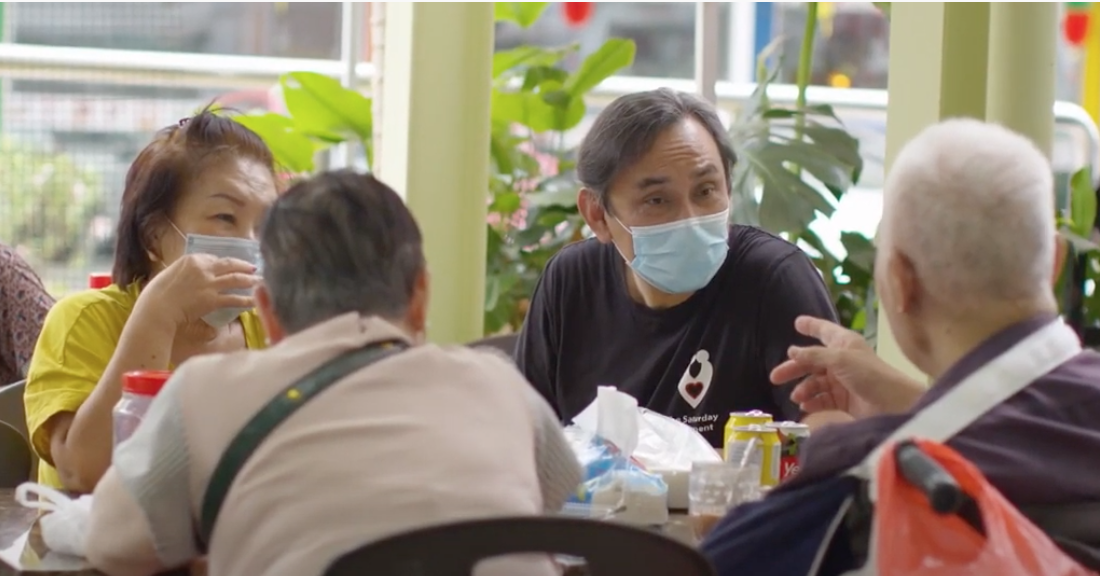
Before the current limits on group sizes, Raymond Khoo (right) continued The Saturday Movement’s weekly gatherings for the elderly at Lengkok Bahru. Screengrab from Heartwarmers: The Saturday Movement on Channel 8.
“More often than not the same thing repeated to me was that, ‘You know, my neighbour went for the jab and felt sick, or was not feeling well, couldn’t eat, had nowhere to go to seek additional help, and then couldn’t lift her arm, couldn’t cook for the kids.’
“So we came up with a programme that if you could go for your vaccine we will give you two meals a day for the next three days.”
“The common thing they talk about is their worry about the food, and in the typical elderly scenario they say, ‘Aiya, bo chiak du si.’ (Hokkien for “don’t eat, will die” – 不吃就会死).
“It’s more about that rather than taking the vaccine and passing on (from it).
“So we came up with a programme that if you could go for your vaccine, we will give you two meals a day for the next three days.
“And I will do one better: We’ll send it to your house as well.
“We started about a month ago. So far, to date, about 78 seniors actually took on this and got vaccinated.
“This is a programme which I felt was from the Lord. And I find that they really love us for actually listening to them.
“But I think that that’s something I heard and that’s something I think we can do – that’s something we have done.”
Isaiah Chng, Cornerstone Senior Centre
Truth: “I will not leave you as orphans.” (John 14:18)
“Older people are orphans, right? They don’t have their parents with them right now. And I would think that, in their generation when they grew up, there was a lot of fatherlessness as well, because the father was there but was not present.
“I see potential in them. I choose to believe that there is still so much more in them.”
“And so they would definitely have experienced that sense of being an orphan, and learnt how to fend for themselves.
“This is what orphans do, whereas sons and daughters will turn to their father and believe and trust that the father will come fight for them.
“God has no grandchildren. To Him, older people are sons and daughters too. Do we see them as Father God sees them?
“I see potential in them. I choose to believe that there is still so much more in them.”
Challenges:
“It’s been different,” Chng concedes, “but I would say it’s just adapting to the times.
“We just try to stay with the guidelines and make the full use of what we can do. That’s how we stay resilient and focus on what’s possible instead of what’s not possible.”
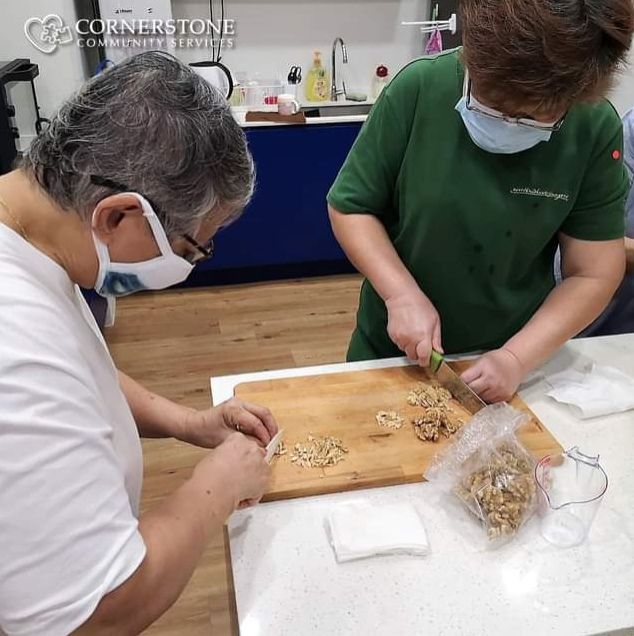
Two-by-two: Limits on group sizes has not stopped the Cornerstone Senior Centre’s regulars from meeting for hands-on activities. Screengrab from CSC Facebook.
One of the motivators behind the Cornerstone Senior Centre (CSC) in Ang Mo Kio’s Cheng San neighbourhood, Chng is also the founder of social enterprise ProAge, a consultancy for workplace health, and the non-profit organisation, Empower Ageing.
“A lot of why they resist technology is in their fear of shame – fear that they cannot.”
In the past, the CSC would see as many as 100 people streaming in at different times of the day. “They all rah-rah together, they can have their little bread after exercise,” he laughs, adding ruefully: “That doesn’t happen anymore.”
Safe distancing measures do not allow big group gatherings, but people still are able to come by appointment. However, the priority has been to pivot online, and CSC is heartened by the engagement.
Some 300 seniors attend its weekday sessions; their oldest regular is 98 years old. “The daily interactions have now been enhanced. You cannot have a big community on the ground but you can still book a session or have daily online interaction.
“So we have a blend – the hybrid, which will increase more touch points, we believe, as we move forward.”
The use of the Telegram app is no hindrance: “I feel that seniors want to use technology, just that there are different barriers.
“We thought, ‘Can we teach them how to use PayNow?’ We felt that they don’t just receive but we should help them give.”
“A lot of why they resist is in their fear of shame – fear that they cannot; the realisation that they will show the world that ‘hey I can’t do something’. That’s something that’s hard to swallow for an older person – someone who should know everything because you’re old.
“They know that technology is good, because they see its benefits. They may not use it like how the younger people use it but they see the benefits.”
Through encouragement and the rewards that came with watching the videos, doing the exercises, and answering quiz questions, CSC staffers got their seniors to interact.
During Chinese New Year, for instance, the old folk were asked to count the decorative ang baos put up in the background and call their answers in. The response was tremendous.
“It got to a point where we thought, ‘Can we teach them how to use PayNow?’ We felt that they don’t just receive but we should help them give.
“It was as if he was dancing on the wheelchair … he was laughing and smiling. And then the next day, I heard that he died.”
“One uncle was so wanting to learn that he went all the way to the bank on his own and opened an account with PayNow.
“I think the key aim was: Can we then be a platform also for learning? Because as an activity centre we need to reimagine. It will have things like exercise, which is the basic.
“Then we have other professionals, different people coming on board and giving their expertise.”
Being screened daily on weekdays, the CSC programme’s frequency made “drip learning” do-able. Topics have ranged from how to use the SingapoRediscover vouchers to how to avoid scams.
“We give them bite-sized tips along the way, so they pick it up,” Chng shares. “We are all for helping them to learn. We believe that education helps children, then we should educate our seniors as well so they can be empowered.”
Love in action:
Chng tells of his pre-Covid experience with an old man in a nursing home who was wheelchair-bound. Initiating the conductor-cise activity (in which an orchestra’s conductor’s movements are mimicked), Chng removed the wheelchair’s foot supports so the man could lift his legs and move them while conducting with his hands.
“You must always focus and love each individual, as if this is your last session with them.”
“It was as if he was dancing on the wheelchair. I remember that I just gave it my all and just really got him moving. And he was laughing and smiling. And then the next day, I heard that he died.
“So this is a story that I always tell my staff: Know that you must always facilitate and focus and love each individual as if this is your last session with them.
“For him, it was his last session, but I was so thankful and grateful that at least he didn’t live his last day being sad and dreary, but he had fun. He had that attention – that full attention, just one-on-one.
“You never know. Just give it your best.”
Kelvin Ng, Pacific Healthcare Nursing Homes
Truth: The Lord hears
“Do not be anxious about anything, but in everything by prayer and supplication with thanksgiving let your requests be made known to God. And the peace of God, which surpasses all understanding, will guard your hearts and your minds in Christ Jesus.” (Philippians 4:6-7)
“When we have peace, we can stay focused. We can then hear from the Lord.”
“Whenever we surrender to the Lord there’s peace.
“When we have peace, we can stay focused. We can then hear from the Lord,” shares Kelvin Ng, the General Manager of Pacific Healthcare’s two nursing homes.
Last year, in the early days of the pandemic when little was known about the Covid-19 virus, one of the homes under his charge was suspected of having a positive case. After a phone call from the nurse manager, both Ng and his wife, Josephine, arose to the need of the hour.
Before he left their home to attend to the incident, she said: “Come, let’s pray before you go.”
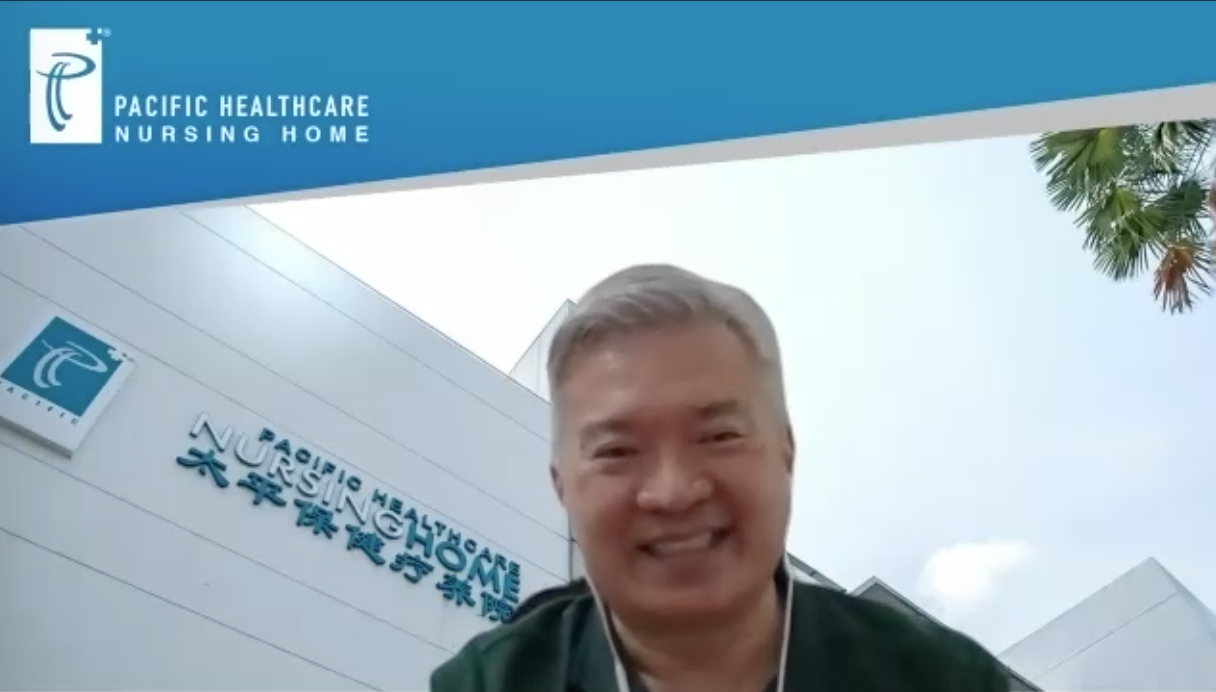
Beyond understanding: Kelvin Ng relies on prayer to give him the peace that only God can give. Screengrab from Zoom interview.
He says: “Our nursing home at Senja is U-shaped. In the centre is a small garden. As my wife prayed for me, I saw a vision of the Lord there, and His hands were spread out as if He was blessing the place.
“That gave me so much peace and confidence.”
Challenges:
Although volunteers are allowed within strict guidelines, the home’s pool of people coming alongside them has dried up. No one comes, and “we do whatever we can”.
Besides the nursing staff, the physio, occupational and art therapists along with the social workers “all chip in to do our programmes”, even though – and perhaps more so – because residents are segregated by zone and can only be grouped in twos.
“The staff will dance to the music. The residents will see and they will be happy. So we do little, little things to encourage them.”
Additionally, activities on a per-ward basis are being piloted. So far, there have been screenings of a short video clip and telling a story. “Even those less active or the bedridden patients – at least they hear some noise, some cheers, some clapping.
“There’s no singing, but the staff will dance to the music. The residents will see and they will be happy. So we do little, little things to encourage them.
“Those who are more alert, we will find time to talk to them. Even when we push their wheelchair, we will talk to them.”
For the residents, that is the extent of on-site interaction currently allowed. Because there can be no visitors, video and phone calls are arranged with family and friends. Some have loved ones who will drop food off for them at the home’s gates.
Love in action:
God has sent many believers into his team, and Ng counts on prayer for unity and direction.
“In the midst of situations like this, our minds are clear to know what to do, and to take instruction and to organise, to coordinate and move.
“That gives us tremendous peace, then we can do what we need to do.”
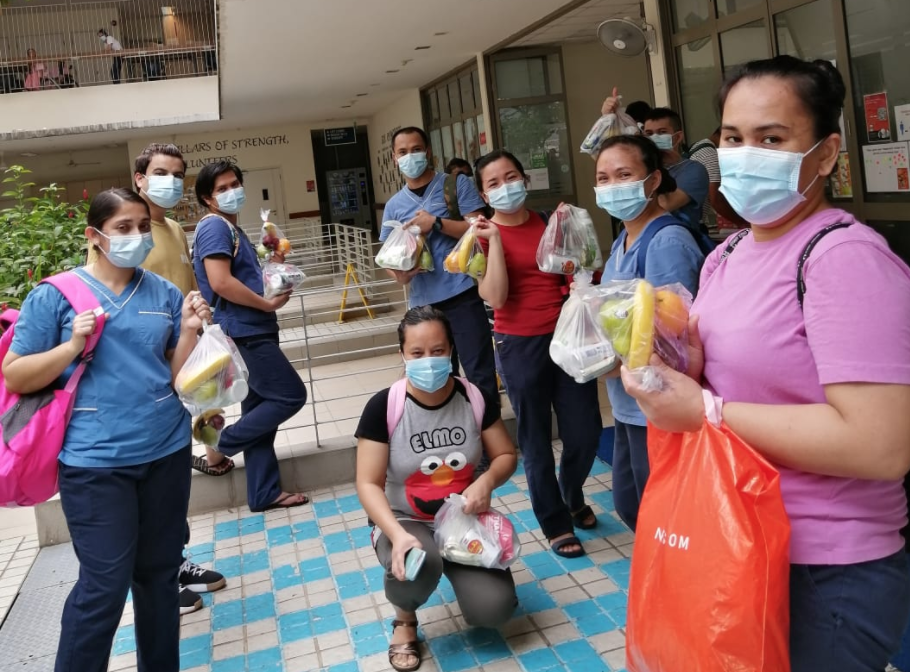
Passion personified: Pacific Health’s staff “just become selfless, they don’t think of anything else but just focus and work”. Screengrab from Pacific Healthcare Nursing Home Facebook.
The last 20 months of snap changes in restrictions have felt like “a roller coaster” ride. Still, Ng says: “You know your co-workers are praying as well. That gives you the kind of encouragement and confidence to move on.
“For people who work in nursing homes, I think somehow we just have the passion. So when we come to this kind of crisis, everybody will just work. They just become selfless, they don’t think of anything else but just focus and work.”
If you’d like to partner Khoo, Chng and Ng in their work with the elderly, you can find out more or donate here:
RELATED STORIES:
Honouring the Abrahams in our midst: Why caring for our seniors is part of revival
Giving God our golden years: 7 tips from seniors who lead the way
Unprecedented suicide rate among S’pore’s aged: Are we failing our elderly?
We are an independent, non-profit organisation that relies on the generosity of our readers, such as yourself, to continue serving the kingdom. Every dollar donated goes directly back into our editorial coverage.
Would you consider partnering with us in our kingdom work by supporting us financially, either as a one-off donation, or a recurring pledge?
Support Salt&Light